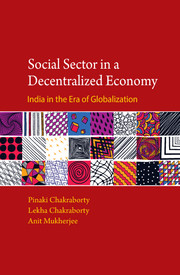Book contents
- Frontmatter
- Contents
- List of Tables, Figures, Boxes and Appendices
- List of Abbreviations
- Preface
- 1 Unpacking Decentralization
- 2 Decentralization in Service Delivery: Empirical Evidences
- 3 Decentralization in India: History, Laws and Politics
- 4 Local-level Fiscal Decentralization: State Finance Commissions and Devolution
- 5 Decentralization of Education
- 6 Decentralization in Health Service Delivery
- 7 Measuring Benefit Incidence: Health and Education
- 8 Effectiveness of Decentralization on Service Delivery: Accountability and Efficiency
- 9 What We Have Learnt and the Way Ahead
- Bibliography
- Index
1 - Unpacking Decentralization
Published online by Cambridge University Press: 26 September 2017
- Frontmatter
- Contents
- List of Tables, Figures, Boxes and Appendices
- List of Abbreviations
- Preface
- 1 Unpacking Decentralization
- 2 Decentralization in Service Delivery: Empirical Evidences
- 3 Decentralization in India: History, Laws and Politics
- 4 Local-level Fiscal Decentralization: State Finance Commissions and Devolution
- 5 Decentralization of Education
- 6 Decentralization in Health Service Delivery
- 7 Measuring Benefit Incidence: Health and Education
- 8 Effectiveness of Decentralization on Service Delivery: Accountability and Efficiency
- 9 What We Have Learnt and the Way Ahead
- Bibliography
- Index
Summary
Decentralization is defined as the transfer of authority, responsibility and resources through deconcentration, delegation or devolution – from the centre to lower levels of administration. Theoretically, decentralization is neither good nor bad for efficiency and equity in terms of public service delivery. It needs to be recognized however that decentralization across countries has been predominantly a political process and not an economic one. The effects of decentralization depend on institution-specific design, which relates to the degree of decentralization and how decentralization policy (in terms of functions, finance and functionaries) and institutions interact. Despite the growing recognition across countries that decentralization can play a pivotal role in the economy for efficient delivery of public goods and services, especially in the countries of sharp regional disparities and heterogeneous population, there is few related literature – both theoretical and empirical – on the topic especially in the context of India.
This book discusses the theoretical and empirical evidences related to the effectiveness of decentralization on specific public services, viz. education and health in India. Apart from an extensive review of literature, the study incorporates fresh analysis of decentralization, both in the Indian and global contexts. It undertakes the analysis of the benefit incidence of decentralized public service delivery with respect to health and education – an area which has not seen much attention in the past. The specific objective of this book is to provide a comprehensive review of research relating to the effectiveness of decentralization on education and health within the broad framework of institutional set-up, the degree of financial autonomy and accountability, and benefit incidence of decentralized public expenditure on health and education.
The study assumes relevance in the context of India for two important reasons. The first and foremost is the legal fiat, i.e. the 73rd and 74th constitutional amendments giving recognition to the local self-governments. The second issue is the fiscal fiat, where there is asymmetry in functions and finance at the local level where functional responsibilities far exceed the revenue resources of local bodies leading to the problems of ‘unfunded mandates’.
- Type
- Chapter
- Information
- Social Sector in a Decentralized EconomyIndia in the Era of Globalization, pp. 1 - 9Publisher: Cambridge University PressPrint publication year: 2016
- Creative Commons
- This content is Open Access and distributed under the terms of the Creative Commons Attribution licence CC-BY-NC-ND 3.0 IGO https://creativecommons.org/cclicenses/



